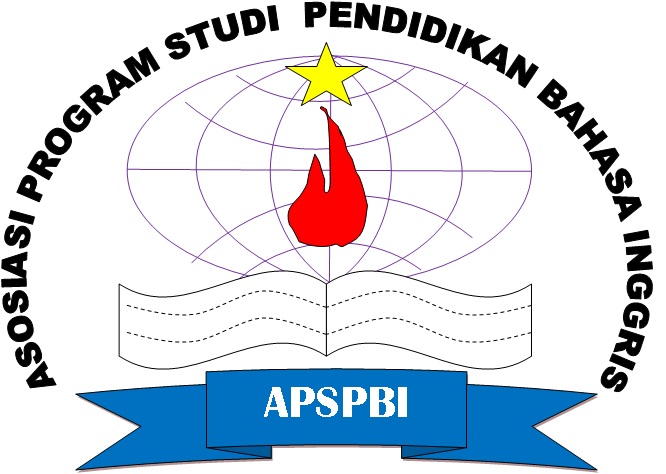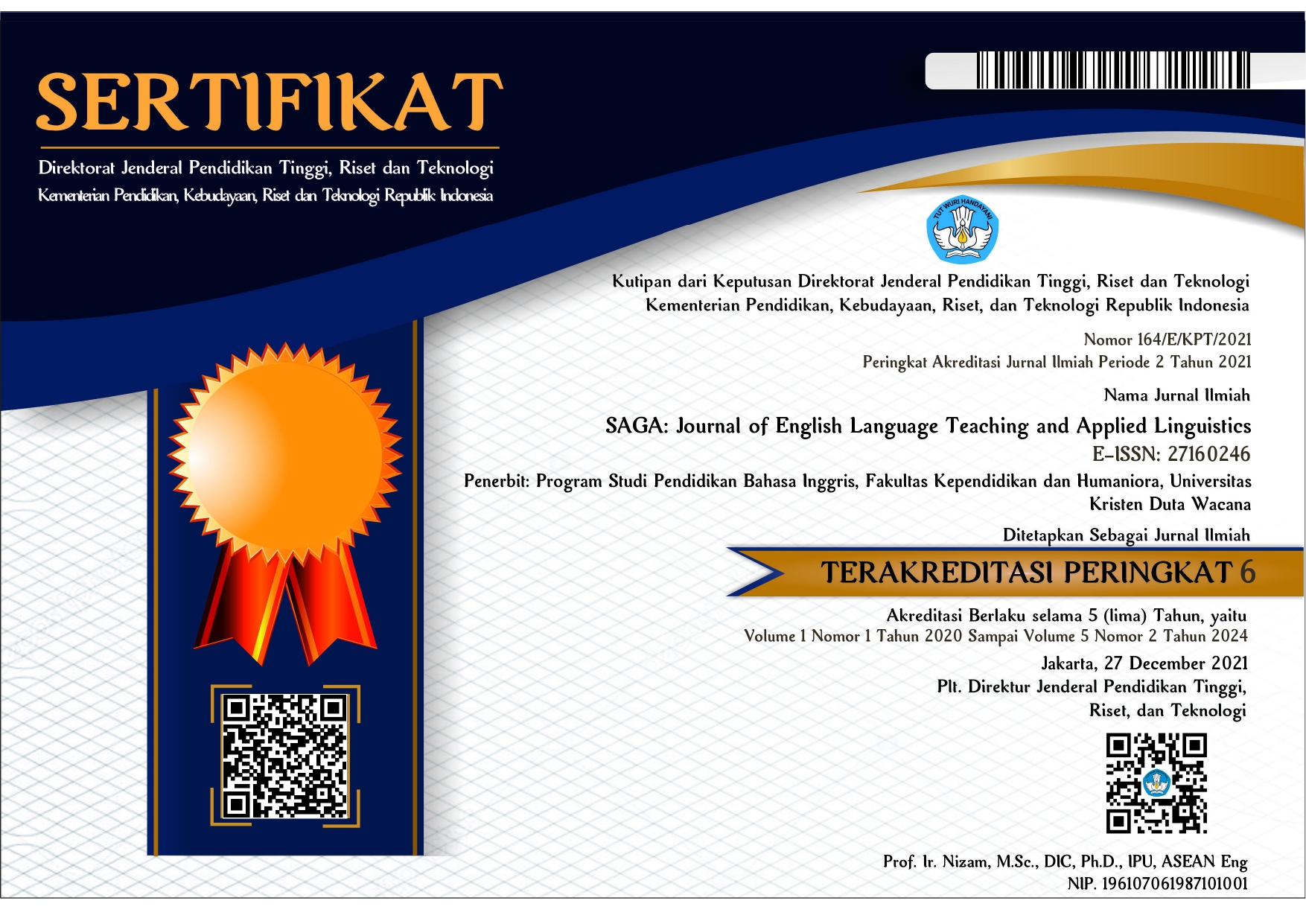The Benefits of Activating Self-Regulation Behavior in Worldwide EFL Speaking Learning Contexts
DOI:
https://doi.org/10.21460/saga.2025.61.205Keywords:
Self-regulation behavior, L2 speaking, library studyAbstract
Transforming worldwide EFL learners into more proficient L2 speakers is a challenging mission as speaking is not merely about the meaningful communication occurrences among interlocutors but also the strong willingness shouldered by EFL learners to regulate their certain behaviors and actions to achieve the targeted learning objectives fully. The previous research results strongly suggested that EFL educators establish, nurture, and reinforce their learners’ self-regulation at the commencement of speaking-focused learning activities in order to make them more confident L2 speakers who are willing to share their thoughts with other classroom learning community members. This present small-scale library study was a little attempt initiated by the researcher to investigate the potential benefits of activating EFL learners’ self-regulation behavior in worldwide speaking learning contexts. To fulfill this main study objective, the researcher conducted a thematic analysis by reviewing 30 previous self-regulation studies conducted globally to obtain more comprehensible research results. The publication years of these 30 published self-regulation articles ranged from 2013 until 2022 to produce more reliable research results. Based on the thematic analysis, there were two major themes yielded namely: (1) Highly self-regulated EFL learners can become more organized L2 speakers, and (2) highly self-regulated EFL learners can transform into more successful L2 speakers. In conformance with these research results, second language-speaking learning instructors are strongly encouraged to cultivate self-regulation behavior within EFL learners at the beginning of learning activities to gradually make them become more high-achieving and self-reliant speakers defining the best strategies suitable for their current speaking learning situations.
References
A’yuni, Q., & Arifa, Z. (2022). How come self-regulated learning overcome speaking anxiety Arabic student? Psychology and Education, 59(1), 17–32. http://psychologyandeducation.net/pae/index.php/pae/article/view/7099
Ahmadpour, S., Asadollahfam, H., & Kuhi, D. (2021). Theoretical analysis of self-regulation on EFL learners' motivation for speaking based on transformative approach. Revista EntreLinguas, e021095. https://doi.org/10.29051/el.v7iesp.4.15652
Alotumi, M. (2021). EFL college junior and senior students’ self-regulated motivation for improving English speaking: A survey study. Heliyon, 7(4), e06664. https://doi.org/10.1016/j.heliyon.2021.e06664
Aregu, B. B. (2013). Enhancing self-regulated learning in teaching spoken communication: Does it affect speaking efficacy and performance? Electronic Journal of Foreign Language Teaching, 10(1), 96–109. https://e-flt.nus.edu.sg/wp-content/uploads/docroot/v10n12013/aregu.pdf
Bademcioglu, M., Karatas, H., & Ergin, A. (2017). The prediction of undergraduates’ self-regulation strategies, motivational beliefs, attitudes towards English, and speaking anxiety on foreign language classroom anxiety. Journal of Human Sciences, 14(1), 571. https://doi.org/10.14687/jhs.v14i1.4132
Burns, A. (2019). Concepts for teaching speaking in the English language classroom. LEARN Journal: Language Education and Acquisition Research Network, 12(1), 1–11. https://files.eric.ed.gov/fulltext/EJ1225673.pdf
Dasa, A. K. L., Adnyani, L. D. S., & Budiarta, L. G. R. (2021). The effect of flipped learning 3.0 and self-regulated learning on twelfth grade students speaking performance. International Journal of Language and Literature, 5(1), 11–19. https://doi.org/10.23887/ijll.v5i1.27693
De Rooij, A. (2022). Speaking to your inner muse: how self-regulation by inner speaking influences confidence during idea evaluation. Creativity Research Journal, 00(00), 1–18. https://doi.org/10.1080/10400419.2022.2124356
El-Sakka, S. M. F. (2016). Self-regulated strategy instruction for developing speaking proficiency and reducing speaking anxiety of Egyptian university students. English Language Teaching, 9(12), 22. https://doi.org/10.5539/elt.v9n12p22
Fadlelmula, F. K., Cakiroglu, E., & Sungur, S. (2015). Developing a structural model on the relationship among motivational beliefs, self-regulated learning strategies, and achievement in mathematics. International Journal of Science and Mathematics Education, 13(6), 1355–1375. https://doi.org/10.1007/s10763-013-9499-4
Heriansya, F., Dalle, M. B., & Ma’ruf, A. (2021). The use of self-regulated learning method to develop students’speaking ability. English Language, 1(1), 9–17. https://jurnal.fkip.unismuh.ac.id/index.php/eltm/article/view/142%0Ahttps://jurnal.fkip.unismuh.ac.id/index.php/eltm/article/download/142/38
Howlett, M. A., McWilliams, M. A., Rademacher, K., O’Neill, J. C., Maitland, T. L., Abels, K., Demetriou, C., & Panter, A. T. (2021). Investigating the effects of academic coaching on college students’ metacognition. Innovative Higher Education, 46(2), 189–204. https://doi.org/10.1007/s10755-020-09533-7
Kelsen, B. A. (2019). Exploring public speaking anxiety and personal disposition in EFL presentations. Learning and Individual Differences, 73(October 2018), 92–101. https://doi.org/10.1016/j.lindif.2019.05.003
Laily Nurjanah, R., Waluyo, S., & Billa Fauzia Tamami, S. (2021). Studies and perspectives in English language self-regulated learning strategy in online speaking class: How Is It Implemented? ELT-Lectura, 8(2), 2550–0724. https://doi.org/10.31849/elt-lectura.v8i2.7456
Larasati, R. (2020). Self-regulated learning on students’ oral presentation performance in academic speaking class. Retain, 8(4), 128–138. https://jurnalmahasiswa.unesa.ac.id/index.php/retain/article/view/34405
Linur, R., & Mubarak, M. R. (2022). Students' perceptions on using the flipped classroom method to support their self-regulated learning in Arabic speaking skills: Exploratory study. Al-Ta’rib: Jurnal Ilmiah Program Studi Pendidikan Bahasa Arab IAIN Palangka Raya, 10(1), 1–12. https://doi.org/10.23971/altarib.v10i1.3812
Mahendra, I. G. A. B., Adnyani, L. D. S., & Budiarta, L. G. R. (2020). The impact of flipped learning 3.0 and self regulated learning toward eleventh grade students' speaking performance. International Journal of Language and Literature, 4(3), 111. https://doi.org/10.23887/ijll.v4i3.30296
Mahjub, E., & Mahjoob, E. (2015). Self-regulation and speaking proficiency in Iranian EFL learners. Journal of Language, Linguistics and Literature, 1(6), 182–188. http://www.aiscience.org/journal/j3lhttp://creativecommons.org/licenses/by-nc/4.0/
Mazenod, A., Francis, B., Archer, L., Hodgen, J., Taylor, B., Tereshchenko, A., & Pepper, D. (2019). Nurturing learning or encouraging dependency? Teacher constructions of students in lower attainment groups in English secondary schools. Cambridge Journal of Education, 49(1), 53–68. https://doi.org/10.1080/0305764X.2018.1441372
Menggo, S., Darong, H. C., & Semana, I. L. (2022). Self-regulated learning method through smartphone assistance in promoting speaking ability. Journal of Language Teaching and Research, 13(4), 772–780. https://doi.org/10.17507/jltr.1304.10
Mohammadzadeh, A., & Sarkhosh, M. (2018). The effects of self-regulatory learning through computer-assisted intelligent tutoring system on the improvement of EFL learners' speaking ability. International Journal of Instruction, 11(2), 167–184. https://doi.org/10.12973/iji.2018.11212a
Nugroho, A. J., Rohman, A., & Geroda, G. B. (2021). Analysis of student self-regulation in learning English speaking skill. EDUCASIA: Jurnal Pendidikan, Pengajaran, dan Pembelajaran, 5(1), 49–58. https://doi.org/10.21462/educasia.v5i1.47
Nurjanah, R. L., Saptanto, D. D., & Dewi, M. K. (2021). Developing modelling-based speaking module for informal interaction to support independent learning of speaking skill. ELT-Lectura, 8(1), 99–111. https://doi.org/10.31849/elt-lectura.v8i1.5660
Palermo, F., Mikulski, A. M., & Conejo, L. D. (2017). Self-regulation abilities and Spanish-speaking preschoolers’ vocabulary and letter-word skills in Spanish and English. Early Education and Development, 28(2), 207–223. https://doi.org/10.1080/10409289.2016.1197670
Pawlak, M., Csizér, K., & Soto, A. (2020). Interrelationships of motivation, self-efficacy and self-regulatory strategy use: An investigation into study abroad experiences. System, 93, 102300. https://doi.org/10.1016/j.system.2020.102300
Safitri, T., Saputra, M., Bina, U., Getsempena, B., Bina, U., Getsempena, B., Mekkah, U. S., Aceh, U. M., & Berbicara, K. (2022). Jurnal Ilmiah Mahasiswa Volume 3 , Nomor 1 , April 2022 The Students ’ Self Regulated Learning Strategies in Speaking. 3(1). https://jim.bbg.ac.id/pendidikan/article/view/475
Saputra, M. E., Adnyani, L. D. S., & Budiarta, L. G. R. (2021). The implementation of flipped learning 3.0 and self-regulated learning on tenth-grade students' speaking performance. International Journal of Language and Literature, 4(4), 157. https://doi.org/10.23887/ijll.v4i4.32081
Sari, N. (2022). Self-regulated training to reduce speaking anxiety of senior high school students in online English learning. New Language Dimensions, 3(1), 2022. https://journal.unesa.ac.id/index.php/nld/index
Sukma, F. (2022). The implementation of self-regulated learning towards EFL students speaking skills: Senior high school case. Inspiring: English Education Journal, 5(2), 117-132. https://ejurnal.iainpare.ac.id/index.php/inspiring/article/view/2721
Sun, P. P. (2022). Strategic self-regulation for speaking English as a foreign language: Scale development and validation. TESOL Quarterly, 56(4), 1369–1383. https://doi.org/10.1002/tesq.3132
Tavallali, E., & Marzban, A. (2015). Instructional efficacy of self-regulated learning on Iranian EFL learners’ speaking ability. Journal of Studies in Learning,2(7), 83–100. http://jslte.iaushiraz.ac.ir/article_522246_2cdd673b5ffaec40a2ab019b35355e0a.pdf
Tee, X. T., Joanna, T. A. T., & Kamarulzaman, W. (2022). Self-regulatory strategies used by Malaysian university students in reducing public speaking anxiety: A case study. Proceedings of the 2nd International Conference on Social Science, Humanities, Education and Society Development (Icons 2021), 146–152. https://doi.org/10.2991/assehr.k.220101.023
Theobald, M. (2021). Self-regulation training programs enhance university students' academic performance. Contemporary Educational Psychology , 10(1), 1-20. https://www.uni-trier.de/fileadmin/fb1/prof/PSY/SUK/Theobald_2021-1.pdf
Uztosun, M. S. (2020). The development of a scale for measuring the self-regulated motivation for improving speaking English as a foreign language. Language Learning Journal, 48(2), 213–225. https://doi.org/10.1080/09571736.2017.1335766
Uztosun, M. S. (2021). Foreign language speaking competence and self-regulated speaking motivation. Foreign Language Annals, 54(2), 410–428. https://doi.org/10.1111/flan.12559
Vahedi, V. S. (2022). The effect of flipped teaching method of learning strategies (cognitive- metacognitive) on the development of learners ’ speaking proficiency and self- regulation in comparison with the traditional approach. Technology and Research Journal, 16(3), 635–646. https://jte.sru.ac.ir/article_1754_a0d7f2dc17687d2844fec1a6ea3a9d26.pdf
Wandler, J. B., & Imbriale, W. J. (2017). Promoting undergraduate student self-regulation in online learning environments. Online Learning Journal, 21(2). https://doi.org/10.24059/olj.v21i2.881
Zimmerman, B. J. (2013). From cognitive modeling to self-regulation: A social cognitive career path. Educational Psychologist, 48(3), 135–147. https://doi.org/10.1080/00461520.2013.794676
















